The solo stringed piano is no longer "lonely", she relies on live broadcast rewards to continue the non-genetic inheritance
"Never heard a voice like this, is this 'playing cotton'?"
"The first time I saw a one-stringed instrument, are you sure it can really play a tune?"
Although it has been live on Douyin for more than two years, such curious questions will still appear on the public screen of Zhao Xia's live broadcast room. And she always took the trouble to answer: Unlike ordinary pianos, the monochord has only one string and one rocker, but it can play 6 zones and 3 octaves. As an autonomous region-level inheritor of the Jing people's single-stringed qin art, she broadcasts on her own Douyin account called "Single-Xin Qin [Jing Wei Tianren]" almost every night, bringing this once little-known musical instrument to more than 40 people. in front of thousands of viewers. With the income obtained through the live broadcast, she was also able to continue the offline solo piano inheritance class.
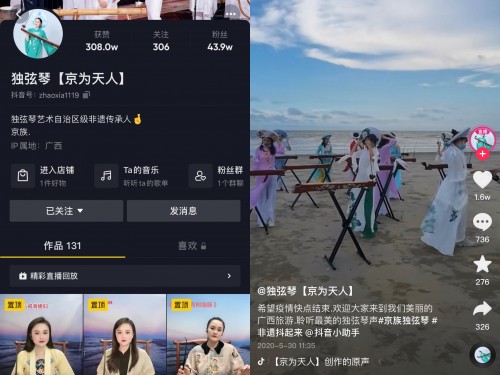
"There are only three girls who can play the lyre"
Entering Zhao Xia's live broadcast room, the audience can discover the uniqueness of the monochord at a glance. One end of the piano body protrudes from the resonator, and a long bamboo piece extends; the other end is used to fix the strings with wedges. Only one string is connected to both ends of the one-meter-long body. However, such a string can play 6 sound zones and 3 octaves.
As a traditional musical instrument of the Jing nationality, the art of the monochord has been widely circulated in the Jing nationality inhabited area in Dongxing City, Guangxi Zhuang Autonomous Region, with a history of hundreds of years. However, in the early years, the traditional solo stringed piano was never recorded, and the Jing nationality population was only 20,000 to 30,000, and many young people also entered the city to work, resulting in few people willing to learn the piano.
"Many young people of the Jing ethnic group don't know that the monochord is their own unique national musical instrument. Moreover, in the early years, the old-fashioned monochord was unimproved, with a sad tone, insufficient sustain, and limited expressiveness." Zhao Xia recalled, Including myself, the teenager did not learn to appreciate this instrument when he learned the piano.
Su Chunfa, the national non-hereditary inheritor of the single-stringed zither, said in a sigh when he talked about this nearly lost skill, "Forty years ago, people who played the single-stringed zither in Mishima of the Jing ethnic group held the fingers of one hand. You can count them all.”

Zhao Xia performs the solo stringed piano in her hometown of Dongxing City, the Jing nationality Mishima
At the age of 16, Zhao Xia formally learned the piano, and gradually realized the charm of the ethereal tone of the solo stringed piano. What fascinated her even more was that, although the structure of the solo stringed piano was simple, it required a lot of skill to play it. Completely different hand rhythm operations, infuse a variety of skills and emotions into the song.
A few years later, although Zhao Xia made some achievements in her studies, when she returned to her hometown after graduation, she found that her opportunities to perform were very limited. More often, Zhao Xia can only work part-time in local scenic spots, performing solo piano for visitors, and is paid 50 yuan a time. The indeterminate job and income made her feel that she would no longer be connected with this "lonely" musical instrument in the future.
Until 2006, Zhao Xia unexpectedly received an invitation call. At that time, she was working as a receptionist at the Golden Beach Hotel in Manmi Island. A folk song festival program called "Folk Songs China" is calling for minority singers and musicians to participate in all parts of the country. When they arrived at the Jing nationality, the local cultural department wanted to form a group of three girls, but they searched around and found only two, and they couldn't get the last one.
The call finally reached Zhao Xia. The rehearsal invitation made Zhao Xia very excited, but for her who had just graduated, her monthly income would only add up to seven or eight hundred yuan. Zhao Xia recalled the opportunity that changed the trajectory of her life: "I didn't have the money to make clothes for the performance at that time, and I didn't have a good piano to use. Fortunately, the Cultural Affairs Bureau decided to bear the full cost, so I had the opportunity to participate in this performance."
Finally, on the stage, three Jing girls performed a song "The Wind Blows Across the Bridge". The peculiar shape and distant tone of the monochord also entered the public's field of vision. In the program, there are also folk music artists from all over the country. They also wore their own national-specific costumes and took to the stage with national-specific musical instruments, which shocked the audience.
This experience rekindled another flame in Zhao Xia's heart.
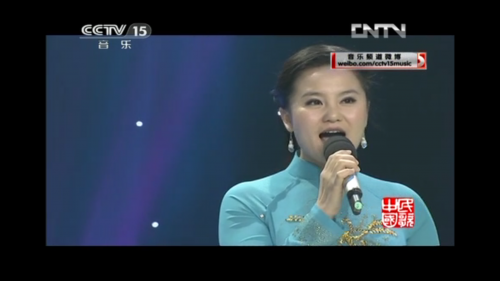
Zhao Xia participated in the recording of the program "Folk Song China"
Accompanied by the solo string for 20 years, she has taught hundreds of students
Zhao Xia decided to learn from a teacher and continue to learn and spread the national skill of the single-stringed violin.
After returning to her hometown, Zhao Xia found Su Shanhui, the first-generation folk artist of the solo stringed piano since she was fifteen years old, and He Shao, who devoted her life to the art of performing the solo stringed piano, and started the road of learning the piano. In order to learn the qin, Zhao Xia had to take a minibus and then a tricycle every week to rush from Dongxing City to Fangchenggang City, which took nearly three hours. On the days when she is not in class, Zhao Xia practices the piano in her rented house for two or three hours in the morning and in the evening. This is the second time she has studied piano with a teacher, and she has been studying for 11 years until her teacher He Shao died in 2017.
Zhao Xia knew that her mission was still going on, and she was still looking for every opportunity to spread the monophonic culture. At the same time, Duxian and Zhao Xia have also been recognized: in 2011, the Jing nationality Duxian art was included in the third batch of national intangible cultural heritage list. In 2019, Zhao Xia became the autonomous region-level inheritor of the Jing nationality solo string piano art. Zhao Xia also took the students to form the "Dongxing City Hamei Group", and once again appeared on the CCTV stage to perform the classic song "The Wind Blows Across the Bridge".
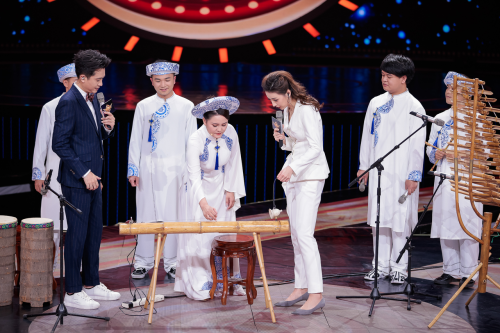
Zhao Xia introduced the solo piano in the program as a member of the "Dongxing Beijing Music Orchestra"
In 2015, Zhao Xia started teaching the solo piano. Initially, the classroom was set up at home, and there were only three students. In order to make more people willing to learn the solo stringed piano, Zhao Xia and her partners carried out popularization and publicity in local primary and secondary schools. "Unlike the guzheng and erhu, the single-stringed piano is already known to others. To convince everyone that they are willing to learn and participate in the non-genetic inheritance of the single-stringed piano, we must let everyone understand first. In the first eight lessons, we will do It is free and public welfare. If you are interested, you are welcome to stay and continue to learn.”
Gradually, there were more than 100 students at the two teaching sites of Zhao Xia at the same time. Over the years, she has brought out 600 or 700 solo-string students, many of whom have come from afar to learn the solo-string. "The students who impressed me the most were a 72-year-old couple from Yingkou, Liaoning Province. They knew a little about the solo stringed piano, but they couldn't find a teacher to improve their skills, so they came from other places. To get here, you need to take a car from Shenyang to Nanning, take a train to Fangchenggang City and then take a bus to Dongxing."
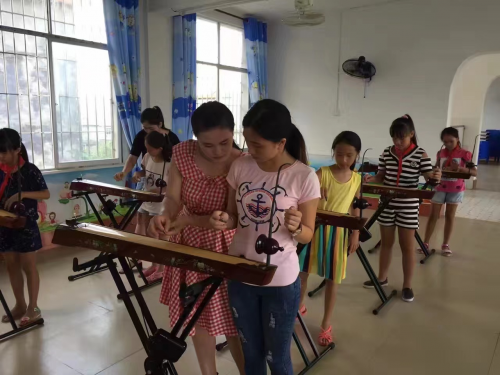
Zhao Xia is teaching in the solo piano classroom
Moving to the live broadcast room under the epidemic, the monochord is no longer "lonely"
Zhao Xia's solo piano inheritance class is on the right track, but the sudden epidemic quickly hit her and her friends with a blow.
"When the epidemic was at its worst, the number of students was directly reduced by half. Since then, classes have not been able to continue." In desperation, Zhao Xia tried to update her performance clips on Douyin, and began to broadcast irregularly.
Initially, the sporadic interactions and the difficulty in dealing with the audience's random tunes made Zhao Xia's live broadcast room seem a little deserted. Gradually, however, Zhao Xia began to try to adapt some popular songs into tunes suitable for solo chord playing, re-adjusting the key and arranging the fingering, so that this ancient skill regained its vitality.
"The songs played by the monochord are all very lyrical and slow rhythms. I want to see if it can perform cheerful and witty music." Zhao Xia said that in the second year of her Douyin, she released the song "Douyin". Playing "Pig Bajie Carrying Daughter-in-law", the elegant and elegant guqin and the fluttering woman in yellow appeared in front of the camera. But when the left hand is raised, it is a familiar and witty tune, "As soon as the video is recorded, it will become popular."
In the live broadcast room that day, thousands of spectators poured in. The audience's comments also started from the very beginning - "This is the first time I saw a stringed musical instrument, is this the legendary 'one tendon'? - Such curious comments gradually turned into appreciation and resonance.
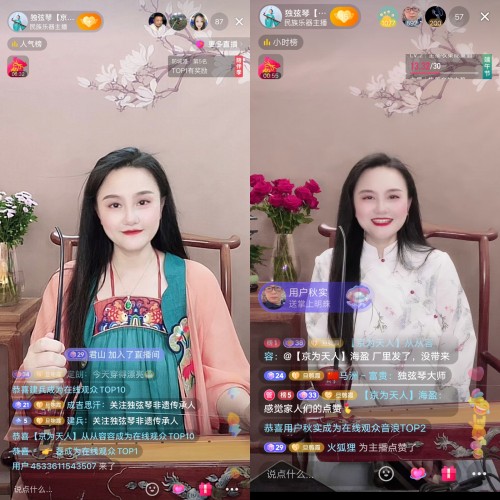
The live broadcast also allowed Zhao Xia to receive reward income. "Right now, we mainly rely on the live broadcast. This is too important," Zhao Xia said with emotion when talking about the income brought by the live broadcast room. This income allows her to continue to subsidize the losses of the solo string classroom. "Although the focus now is on Douyin, I still want to stick to the solo piano classroom. If the epidemic continues, I and several other teachers may make another Douyin account to talk about Jing culture and culture. Solostring skills. See if you can add a little more income to cover expenses.”
In Zhao Xia's live broadcast room, she occasionally plays and sings the classic song "The Wind Blows Across the Bridge".
"There was a strong wind across the bridge today, the wind blew the wind, and the bamboo hat was blown into the sky." The melodious singing seemed to describe the emotions, more like Zhao Xia's ups and downs in the inheritance of the solitaire. According to legend, the single-stringed qin was originally made by the ancestors of the Jing people, inspired by the sound of the ropes of the mast, the swing of the scull and the ship, and imitated it. Although the twists and turns of fate have been written in its genes, but at the end of the story, it can always return to Hong Kong with full sails.
 渝公网安备 50010702504639号
渝公网安备 50010702504639号